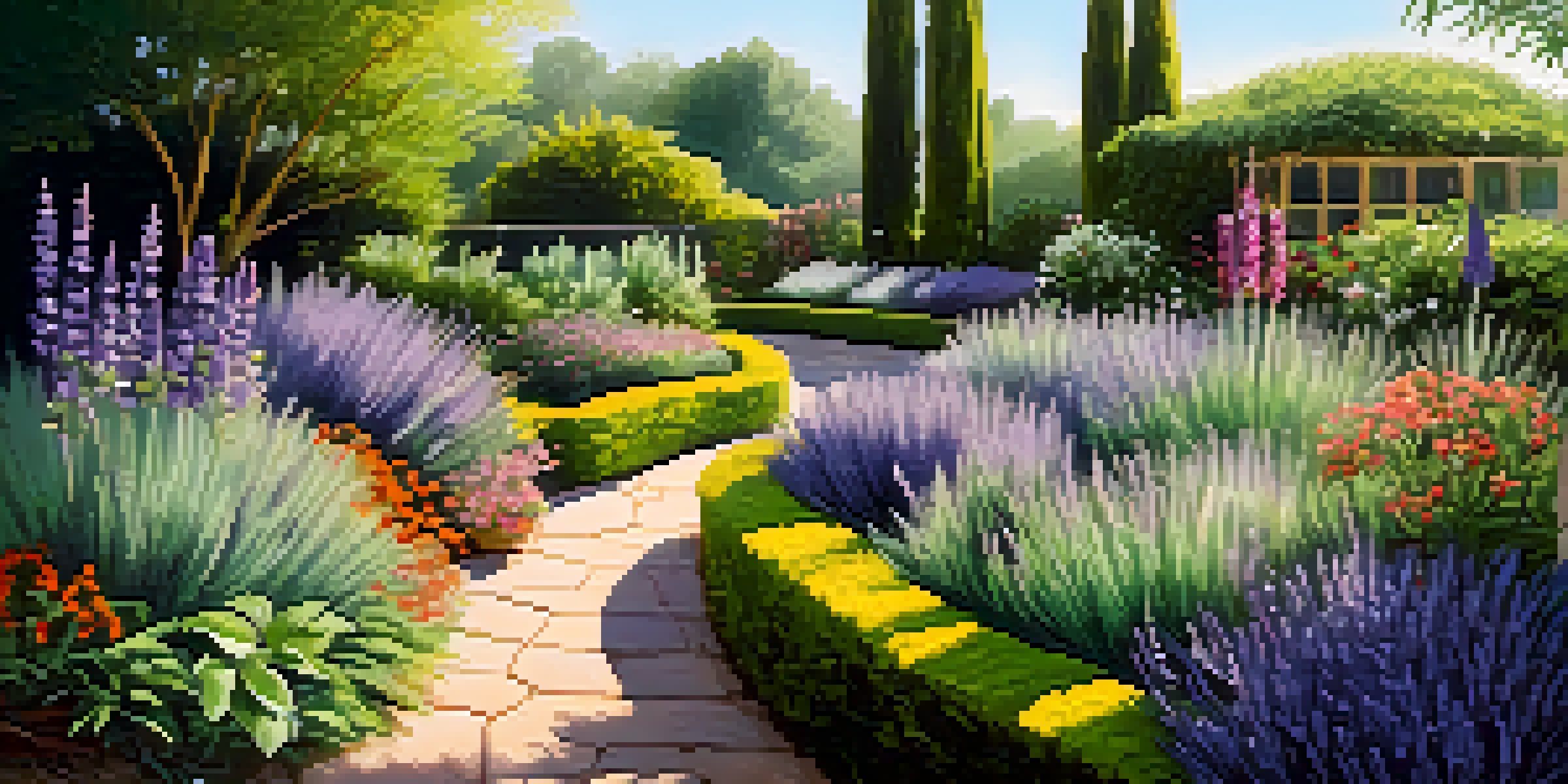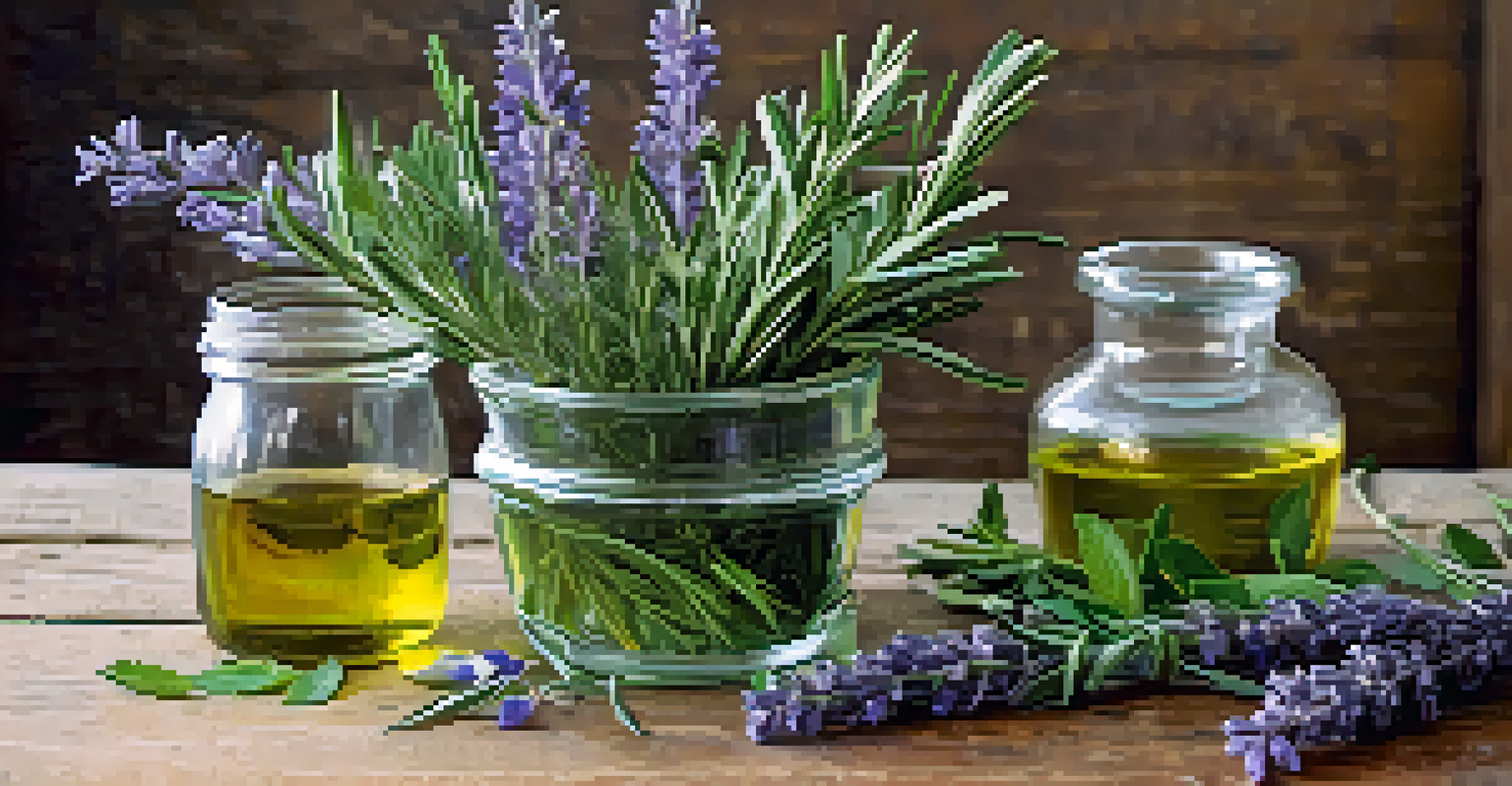Herbs for Fragrance: Creating a Scented Garden

The Allure of Scented Gardens: Why They Matter
There's something enchanting about a garden filled with fragrant herbs. These aromatic plants not only beautify your space but also elevate your mood and enhance your outdoor experience. Imagine stepping into your garden and being greeted by a delightful medley of scents that can transport you to a tranquil escape.
A garden is a friend you can visit anytime.
Fragrant herbs can also play a role in attracting beneficial pollinators, such as bees and butterflies. These little helpers not only ensure your garden thrives but also contribute to the broader ecosystem. By cultivating a scented garden, you're not just creating a feast for the senses; you're also promoting biodiversity.
Moreover, scented gardens offer an opportunity to connect with nature in a personal way. The act of tending to fragrant herbs can be therapeutic, providing a much-needed break from our fast-paced lives. It’s a simple pleasure that can bring joy and relaxation to your daily routine.
Choosing the Right Herbs for Fragrance
When it comes to creating a scented garden, the choice of herbs is crucial. Popular options include lavender, rosemary, and mint, each bringing its unique aroma and characteristics. Lavender, for instance, offers a soothing floral scent that can help reduce stress, while rosemary provides a robust, earthy fragrance that can invigorate your senses.

Consider the climate and environment of your garden as well. Some herbs thrive in full sun, while others prefer partial shade. Understanding these needs can help you select herbs that will flourish and provide the fragrance you desire. For instance, if you live in a warmer climate, you might find that basil and oregano not only smell divine but are also quite resilient.
Fragrant Herbs Enhance Well-Being
Scented gardens not only beautify spaces but also elevate mood and promote relaxation.
Don’t forget to think about the height and spread of each herb. Mixing taller herbs like lemon balm with shorter ones like chives can create a visually appealing garden while maximizing fragrance. This layering effect can also enhance the overall aesthetic of your space.
Designing Your Scented Garden Layout
Creating a scented garden isn't just about the herbs you choose; it's also about how you arrange them. A well-planned layout can enhance your garden's fragrance and visual appeal. Consider placing taller herbs at the back and shorter ones in the front or creating winding paths that allow you to experience the scents as you stroll.
The earth laughs in flowers.
Incorporating different textures and colors can also enrich your garden. For instance, the soft, silvery leaves of sage contrast beautifully with the vibrant greens of parsley. This variety not only pleases the eye but can also make the scents more complex and interesting as they mingle in the air.
Another approach is to group herbs with similar fragrance profiles together. A section dedicated to culinary herbs like basil, thyme, and oregano can create a delightful cooking space, while a corner filled with sweet-scented blooms like lavender and chamomile can serve as a peaceful retreat. Mixing and matching can lead to surprising and delightful combinations.
Caring for Your Fragrant Herbs
Maintaining a scented garden involves regular care, but it’s relatively simple once you get the hang of it. Most fragrant herbs prefer well-drained soil and should be watered when the top inch of soil feels dry. Be mindful not to overwater, as many herbs are prone to root rot if they sit in soggy soil.
Pruning your herbs is also essential for encouraging growth and maintaining their fragrance. Regularly cutting back stems not only helps the plants thrive but also releases their aromatic oils, enhancing the overall scent of your garden. Plus, it gives you a chance to harvest herbs for cooking or making teas.
Choose Herbs for Ideal Conditions
Selecting the right herbs based on climate and layout ensures a flourishing and aromatic garden.
Lastly, keep an eye out for pests and diseases. Natural remedies like neem oil can help keep your garden healthy without harsh chemicals. A little vigilance goes a long way in ensuring your fragrant herbs continue to flourish and fill your garden with delightful aromas.
Using Scented Herbs in Everyday Life
The beauty of a scented garden extends beyond its visual appeal; it can also enrich your daily life. Freshly harvested herbs can be used in cooking, teas, and even homemade beauty products. Imagine infusing olive oil with rosemary or creating a calming herbal sachet with dried lavender.
Scented herbs can also play a role in natural remedies. For instance, peppermint can help soothe headaches, while chamomile is known for its calming properties. By incorporating herbs from your garden into your wellness routine, you not only enjoy their fragrance but also their benefits.
Moreover, sharing your herbal creations with friends and family can spread the joy. Whether it's gifting a jar of homemade herb-infused vinegar or inviting friends for a fragrant herbal tea party, the possibilities are endless. Your scented garden can become a hub of creativity and connection.
Seasonal Considerations for Your Scented Garden
Gardening is a year-round endeavor, and understanding seasonal changes is key to maintaining your scented garden. In spring, focus on planting and nurturing new herbs. This is the best time to expand your collection or replace any herbs that didn’t survive the winter.
As summer approaches, regular watering and harvesting become more important. During this time, herbs like basil and mint thrive, so don’t hesitate to snip and use them in your meals. Regular harvesting can encourage bushier growth, leading to a more fragrant garden.
Seasonal Care for Longevity
Understanding seasonal changes is crucial for maintaining your scented garden and enjoying its benefits year-round.
When autumn arrives, consider preserving your herbs for winter use. Drying or freezing herbs can help maintain their fragrance and flavor. This not only extends the life of your plants but also allows you to enjoy the scents of your garden long after the growing season has ended.
Inspiring Others with Your Scented Garden
Creating a scented garden can inspire others to connect with nature and explore gardening themselves. Share your journey on social media or invite friends over for a garden tour. Your enthusiasm can spark interest and encourage others to cultivate their own fragrant spaces.
Consider hosting workshops where you teach others about the benefits of fragrant herbs and how to grow them. This can be a fun way to build community and share your love for gardening. Plus, it allows for a practical exchange of ideas and tips.

Documenting your progress through photos and stories not only serves as a personal record but also provides inspiration for others. Whether through a blog or social media, sharing your successes and challenges can help aspiring gardeners feel connected and empowered to start their own scented garden journey.